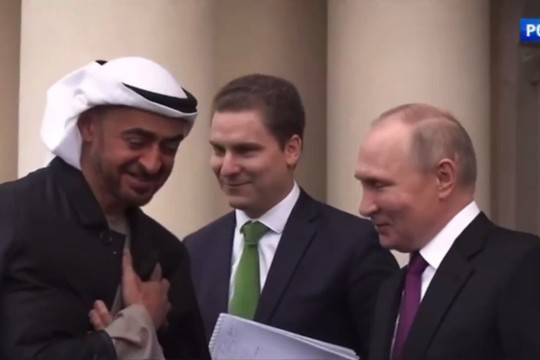Vladimir Putin gave his coat to Muhammad bin Zayed, President of the United Arab Emirates.
Photo: Russian TV
It started with Saudi Arabia. President Biden was met with cool, if not cold, greetings during his visit to Riyadh last July. Then the Saudis picked China to mediate their rapprochement with Iran. Nobody from Washington or Brussels was in the room to get the two old enemies shaking hands. Next up is the United Arab Emirates, FORBS notes.
Around the world and within the Gulf, it is best known for Dubai and Etihad Airlines. The country, like the Saudis, used to take its cues from the U.S. in many ways. Today, however, Abu Dhabi will act on the Emirates’ collective interests, and if that means it must disagree or break away with the U.S. on matters of geopolitical significance, then so be it.
Biden invited UAE President Mohammed bin Zayed (MBZ) to come to Washington last summer. The fact that the visit still has not happened is indicative of difficulties in the relationship between UAE and the Biden Administration.
“It is highly unlikely for the UAE president to visit DC because of the political tensions between them, especially with the growing and evolving relationships with China and Russia, long in the making,” says Dr. Theodore Karasik, senior advisor at Gulf State Analytics in Washington, D.C. “The Emirates have a particular Khaleeji outlook (meaning ‘from the Gulf’) that models their world view and is close in vision to countries in the East as opposed to countries of the West. The UAE sees policy issues differently, where patience is key instead of immediate gratification,” he says. “They’re going to wait and see what happens because politics are constantly changing (in the U.S. and Europe). But the West is no longer the exemplar.”
America's clout with its regional partners is being put to the test. Developing world watchers only need to look at the U.S.'s lack of success at enforcing its sanctions against Russia as a key indicator. The UAE serves up yet another example of a general “pulling away” from Western leadership.
Over the past several months, a parade of senior U.S., U.K., and European Union officials have traveled to the Emirati capital city of Abu Dhabi to plug one of the biggest holes in the sanctions regime against Russia. Exports of electronic parts from the UAE to Russia increased sevenfold in the past year. Microchip exports from the UAE to Russia were 15 times higher in 2022 compared to 2021, and last year the UAE sold 158 drones to Russia. Washington sanctions restricted all of these items.
The UAE occupies an entirely different position in the pecking order of U.S. allies. “There is frustration in D.C. over the UAE’s role in enabling Russian business and capital to find a home from sanctions, although there is some acknowledgment that neither the Emiratis nor the Saudis will bow to pressure to take sides,” Kristian Coates Ulrichsen, a Middle East fellow at Rice University's Baker Institute, said. “Everyone is adapting to the new normal in which the relationship is more non-aligned than ever before.”
Washington has made it clear that sanctions enforcement is a policy imperative The Treasury Department's Undersecretary for Terrorism and Financial Intelligence has already singled out the UAE for "poor sanctions compliance." And over the past six months, the U.S. government has sanctioned at least three Emirati entities for their illicit trade with Russia.
“That said, the UAE and other Gulf states are committed to adjusting to the reality of what they see as a now permanently multi-polar world,” Matthew Levitt, director of the Reinhard Program on Counterterrorism & Intelligence at The Washington Institute for Near East Policy, says. “They see the U.S. as their preferred security partner but want close ties to China and Russia and refuse to see these in binary terms.”
More importantly to the U.S. both commercially and in terms of political power, the UAE is the fourth largest recipient of U.S. arms transfers after Saudi Arabia, Australia and South Korea. Since 2009, the UAE has been the number one export market for U.S. goods in the Middle East. And the U.S. trade surplus with the UAE is America’s sixth largest globally, which is impressive given the U.S. runs a deficit with nearly every country. In 2020, UAE capital accounted for about $45 billion of investment flows to the U.S.
One retired diplomat who did not want to be quoted on the record told: “if the United States is serious about making Russia sanctions work, then it cannot go easy on the UAE.”
“If President Biden and his team really mean what they say about being tough on Russia, then it seems they have to be prepared to engage in difficult diplomacy with the UAE over its relationship with Russia. That’s the hawk view,” FORBS supposes.
read more in our Telegram-channel https://t.me/The_International_Affairs

 11:02 17.04.2023 •
11:02 17.04.2023 •























